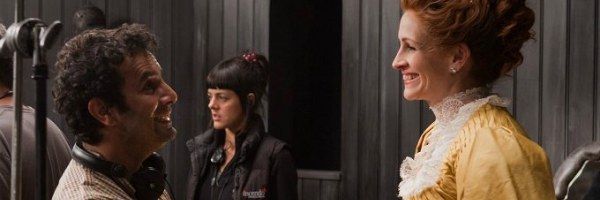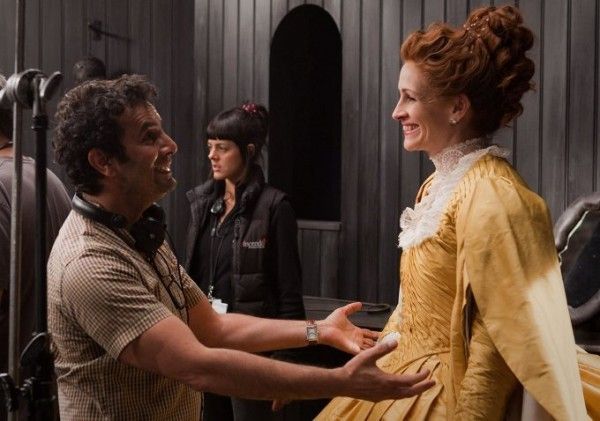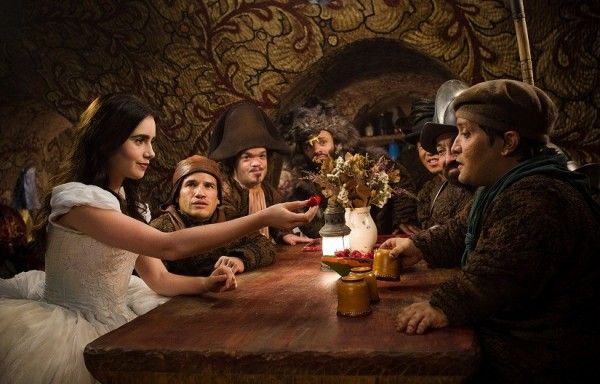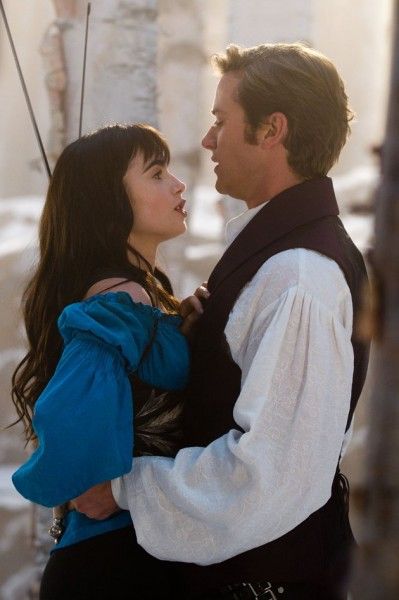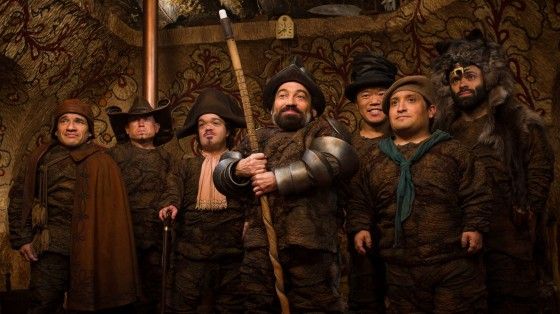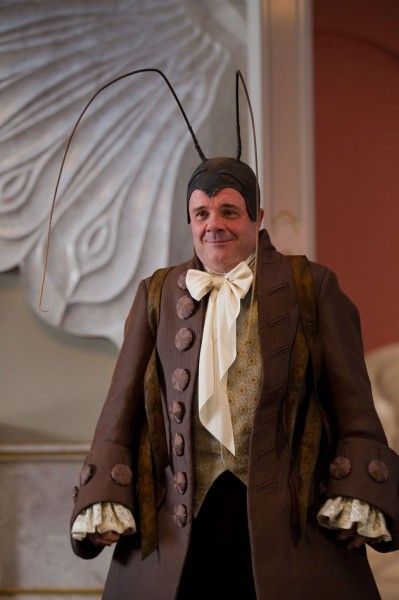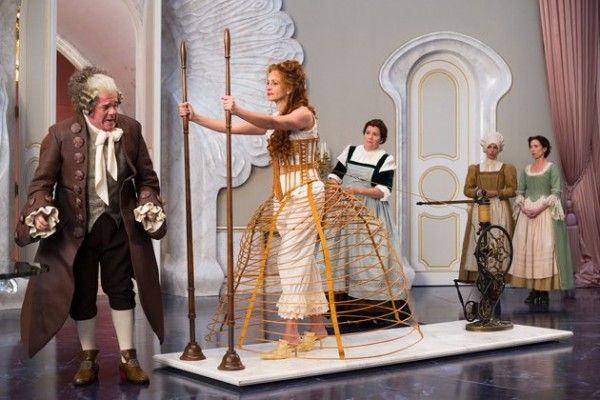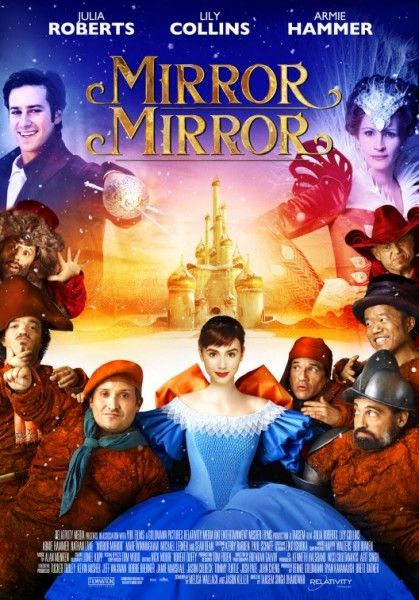Mirror Mirror is a fresh and funny retelling of one of the most beloved stories of all time, brought to life in the visually exciting way that only director Tarsem Singh can. After a beloved King (Sean Bean) vanishes, his ruthless wife, the Evil Queen (Julia Roberts), seizes control of the kingdom and keeps her beautiful 18-year-old stepdaughter, Snow White (Lily Collins), hidden away in the palace. But, when the princess attracts the attention of a charming and wealthy visiting prince (Armie Hammer), the jealous Queen banishes the girl to a nearby forest, where she is taken in by a band of rebellious but kind-hearted dwarfs who inspire her to become a brave young woman determined to save her country.
During this recent exclusive phone interview with Collider, Tarsem Singh (Immortals, The Cell) talked about what attracted him to this project, why he wanted to make it into a family film, the changes he wanted to make to the script, his feelings about actors ad-libbing on set, what made Lily Collins the perfect Snow White, the biggest challenge for him when it came to editing, and how he has no idea what special features might be on the DVD, but that he really only has maybe one deleted scene. He also talked about his desire to Eye in the Sky, a non-visual story about a drone attack, for his next film, that he hopes to still be able to make The Killing on Carnival Row after that, and why he loves getting to create and construct alternate realities for a living. Check out what he had to say after the jump.
Collider: What was your first reaction, when you were approached about bringing the story of Snow White to life in a live-action feature?
Tarsem Singh: Everybody that knew me said, “Don’t even give him the script.” But, the moment it came to me, I said, “Yes,” without blinking. I just looked at it and said, “If you’re looking for a gritty, redefining, dark tale, I have no interest in it. By the time I’d be done with that, it would be a really hard R. I’d like to make a family movie out of this.” And then, after they asked, “Are you sure?” a couple of times, everything flowed perfectly right. I’ve done three movies that have all been kind of R, and I felt like doing a kiddie movie. I wanted to do a non-visual film first, but the thing came together so quickly. So I said, “Let’s do another visual film, but let’s do a kiddie one.” Everybody who knew me said, “Don’t even give it to him,” but when it finally got to me, I just said, “Yeah, let’s make it tomorrow.”
Was it daunting to take on one of the most beloved stories of all time, or is it that challenge that attracted you to it?
Singh: I think I’m quite naive, in that particular way. Everybody keeps asking me, “Wasn't it intimidating, going to Julia [Roberts] and talking to her?” And I just said, “Really?” I live in a little bubble. I had never seen the original Snow White until about a month and a half ago. So, it is an iconic thing, but it was not really a big thing. With Julia, when I met her, I just thought, “Oh, my god, she’s just a mom.” That was it. Everybody was like, “Oh, my god, this is a big thing you have to take on!” I guess the only reason it doesn’t intimidate me is because I’m just naive about that kind of stuff.
Once you had signed on as director, did you make big changes to the script?
Singh: Yes. Basically, when we came on, I said, “There is a tone in it that is very interesting.” Once the producers got the tone, they were really wonderful. I’ve always taken on scripts that aren’t really on paper, apart from The Fall, which was just a personal thing where I could do whatever I wanted. As you make changes, it’s a really uphill fight, but with this particular one, that wasn’t the case. There were quite a lot of changes done to it, as we took it on, but once we started and said, “It’s a children’s film and the Queen is likable,” we just went from there to say, “It will have the most beautiful Prince and the most pure Snow White that you can think of.” Once those characters were defined, we went along those lines. Everybody showed a lot of surprised when I said that I wanted to go with real dwarves. They were like, “Are you sure? You’re going to be so limited.” But, that was the only practical answer. So, things tended to change, but it ended up having the exact tone that we set out to make.
What do you think it is about the Snow White story that seems to hold so much interest for people, with two movies this year, Once Upon a Time on television, and the Fables comic book?
Singh: Financially, why it’s coming out so much is that, for the first time after the success of Alice in Wonderland, people looked to that and realized that these iconic tales are public domain movies. That’s why there are so many of them getting made. When you go to the most iconic of fairy tales, it happens to be this one about an old woman giving an apple to a young girl. When you say that to anybody, they’ll tell you the story. I just said, “Where do you go from there now?” In the original one, there’s a lot of singing. It’s a cartoon from a very long time ago that’s absolutely brilliant, but it moved on from there. Today’s audiences wouldn’t have sat through that. It’s just about vanity and who’s the most beautiful one. It had to be much bigger than that. Just by that definition, when you go to the Huntsman tale, you just take one part of it and it’s a completely different film. Within that same structure of somebody wanting to overthrow a younger person and get her out, you can tell a different tale with a million different angles from that same one.
In this film, Snow White really learns to empower herself without relying on the prince. Was it important to you that this character find her own inner-strength before marrying her prince?
Singh: That actually came, very much, from the producers and the script. For eons, women had the short end of the stick. Now, suddenly, it is so politically correct to go into that particular realm. The pendulum is swinging that way. Everybody in today’s culture knows that having a girl isn’t bad. The West has embraced that so beautifully. They’re always trying to tell girls something that would have never been told in history, which is that you can be anything. You can be a pilot, you can be the president, you can be anything. But, that existed before. I loved it and just said, “That goes in.”
Do you enjoy when actors feel comfortable enough with their characters to ad-lib on set, or would you prefer that they stick to the script?
Singh: I would say that I do, but not if it’s different every time, or if it’s a film where it’s just one take and you’re shooting it all hand-held, or with 10 telephoto cameras and you get all your coverage and it’s done. I like people to find it and improvise it, but once they’ve got it, when I do the other angles and the other cameras, and it’s purely an out-and-out comedy, where you only really get the right timing once, keep it the same. I like somebody like Julia [Roberts], where you change your camera angle and, unless you say something different to her, it will come out like a clock from the previous take. If you don’t change it, she just gets it. For me, I love that. Work it out and find it, and then stick to that until we finish the scene. I tend to shoot like that. It’s better because my coverage tends to be a little bit more than telephoto cameras.
What was it that made Lily Collins the perfect Snow White?
Singh: Apart from the eyebrows, you mean? They help. Of course, everybody turned it into a joke because I made those comments earlier. They were like, “You really cast her for the eyebrows?” They are one element of her. I had actually met her for Immortals. She was really sharp, but she wasn’t right for that part. She was the last person I cast. I first cast the Queen, and then I went for the Prince, and then I started looking for Snow White. And there was a push towards certain girls, but I was like, “No, let’s just hang in there.” Lily was the only one that, when she came in, I wasn’t there and somebody said, “We just saw this girl. You need to take a look at her tape.” I said, “Oh, I know her.” They said, “Just look at the reading,” and I said, “No, the tone is perfect.” They said, “But, by tonight, she might not be available.” So, because Julia Roberts had to have the okay on the casting, under contract, I said, “Can you call her?” I told her, “I’ve just met this girl and I like her a lot, but we might lose her.” And she said, “I don’t need to know who that is. If you like her, go for it!” That was just such a wonderful, empowering statement. It was just easy from there. But, Lily is amazing! I just thought she was so beautiful. She is on the cusp of becoming a woman. She could be naive. She could play everything. She just couldn’t punch well. I said, “Learn to punch! It doesn’t have to be real for you. It has to be real from where I tell you I’m looking from.” Once she got that, that was it. The only thing I had to teach her was how to punch. Everything else came from Lily.
All of the dwarves really have their own personalities. Were those individual personalities established ahead of time, or did it develop from who you cast?
Singh: It developed from who we cast. Even the names weren’t done, until I had them together. The last guy’s name, Chuckles, came like two days before. When we started working with them, we figured out each guy’s personality. It had to come from them. They were there for a month and a half, and we worked with them on what each guy would be. It worked out very well.
How did you decide to have them get around on stilts?
Singh: That was a very practical approach. We wanted to make the fighting exciting, in a family sense. There wasn’t going to be big monsters and all that, so I said, “You’ve got to make it playful, almost like they’re on an accordion. Think of that for the legs, and then you can get stunt guys to fight and mask them.” I didn’t have any effects to do with it.
Was there a scene that was most challenging for you to edit?
Singh: No. Scale has never bothered me. I wouldn’t say that scale had anything to do with it. It’s always the intimate scenes that are difficult. For me, the balance of big and small, and macro and micro, is what gets me. The macro and micro balance needed to feel correct for it to look grand and intimate, at the same time. When you’re making it for $100 million, for a bigger audience, you tend to take in their concerns about whether it doesn’t flow. If there’s too long of a build-up about something, when it’s for children, they’ll get antsy. You take all of that into consideration, and you make the movie.
Do you know what extras and special features you’ll have on the Blu-ray? Do you have many deleted scenes?
Singh: I don’t know. There might be one scene that I remember being deleted. There wasn’t anything deleted. It was very tight, when we started shooting. Practically everything is in there. But, I think everybody knows that I have a really bad, big mouth. Immortals was the first film of mine that they released on Blu-ray, and nobody ever asked me if I wanted to do commentary. They were probably scared of the crap that I’d say. But, no, I’m not aware of it. Maybe I should be asking them. My niece had a little camera and she would ask me questions, every now and then, and someone would say, “You said that on camera,” but I said, “This is my niece!” So, I don’t know. I’ll have to check. I don’t think I did any commentary for the DVD. I don’t remember doing anything for it.
Do you know which of your possible projects you’ll do next?
Singh: There is one that I’m very, very close to, and I’ll know in the next 10 days, if they’re going ahead with it. It’s called Eye in the Sky, and it’s about a drone attack. It’s a very, very non-visual, profound little story that I want to make, and hopefully it comes together within the week.
Are you also going to do The Killing on Carnival Row?
Singh: I’d like to, but I don’t want to do only big visual movies, back-to-back. Right now, that hasn’t been cast and we’re still working on some stuff with it. So, I just thought, “I’d like to put a small film in between,” and I found a small film. But, at the same time, I hope that doesn’t derail because I do have a take on it.
Do you have a dream project that you’d love to do, but haven’t had the opportunity to do yet?
Singh: No. I’m living the life that I wanted to live and I’m loving every little thing that I do. Fortunately, for the last 50 years, I have had a very, very charmed life. If someone asks, “Is there a location you want to go to?,” I can say, “Oh, I’ve been there, shot it and loved it!” That one time that my heart broke was unbearable. That was the only time, wherever I was, that I wanted to be somewhere else and do something else. Right now, apart from those four years of my life, wherever I’ve been, that’s what I wanted to be doing, right then.
What do you enjoy most about getting to create and construct alternate realities for a living?
Singh: You mean, what does it feel like, trying to play God? I always just say that I would pay them to do the exact same thing. And they pay me, so I’m not complaining. I’ll take it! It’s the only thing I know how to do. I would pay them to do exactly the same job that I’m doing.

